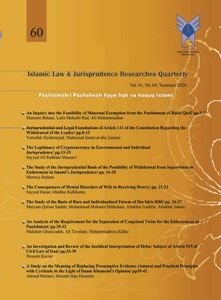The Study of the Basis of Rare and Individualized Fatwas of Ibn Idris Hilli
Subject Areas : Private law
maryam ghafoori
1
,
mohammad mohseni dehkalani
2
,
Ali Akbar Izadifard
3
,
Aliakbar jahani
4
![]()
1 - Ph.D. student of theology of Islamic jurisprudence and law. Mazandaran University. Babolsar. Iran.
2 - Associate Professor, Department of Jurisprudence and Fundamentals of Islamic Law, Mazandaran University, Mazandaran, Babolsar, Iran
3 - Professor, Department of Jurisprudence and Fundamentals of Islamic Law, Mazandaran University, Mazandaran, Babolsar, Iran
4 - Assistant Professor, Department of Jurisprudence and Fundamentals of Islamic Law, Mazandaran University, Mazandaran, Babolsar, Iran
Keywords: Ibn Idris, concealment of evidence, rare fatwas, individualized hdith, precaution,
Abstract :
Ibn Idris was the only jurist of the sixth century who was able to pave the way for the presentation of new ideas and the evolution of Shiite jurisprudence by criticizing the views of his predecessors, especially Sheikh Tusi, and in the field of ijtihad and jurisprudence he chose principles that gave his jurisprudence a special character. The book Al-Sara'ir Al-Hawi li-Tahrir al-Fatawi contains his fatwas and jurisprudential theories, some of which are notorious and contrary to the famous theories, but some of which are his own. Since the purpose of this study is to investigate the basics of and reasons behind Ibn Idris's differing opinions, examples of these views such as prayer in two suspicious clothes, vague confession, execution of the permissible limit, etc. have been explored. The descriptive-analytical method explains the basics, documents and their cause. Belief in the unreliability of the individualized hadith is one of the most important principles of Ibn Idris, which on the one hand, due to his principles and on the other hand in terms of the temporal dimension of the evidence, has caused the actions of the people before him to be hidden from his vision. This has led to a lack of reliance on a large part of the hadiths of the infallibles, and as a result, the individuality and rarity of his views
_||_
The Holy Quran
Najafi, M. (1418). Jawahar al-Kalam. (7th ed.). Beirut: Dar Al-Hayya Al-Arabi Heritage.
Abu Bakr, A. (1406 AH). Sunan al-Bayhaqi. Beirut: Dar Al-Kitab Al-Ilmiya Publishing House.
Abu Zakaria, M. (n.d.). Al-majmou'. Al-Irshad School.
Abudawood, S. (1412 AH). Sunan Abi Dawood. Beirot: Dar Aljeil.
Akhund Khorasani, M.K. (1409 AH). Kifaya al-osoul. Qom: no publication.
Alam al-Huda, M. (1415 AH). Intisar fi infiradat al-Isklamiya (1st ed.). Qom: Islamic Publications Office affiliated with Qom Teachers Association.
Alam al-Huda, M. (1988). Sharia under the principles of Sharia. Tehran: University of Tehran.
Ameli, M. (1427 AH). Zobdah al-fiqhiyah fi sharh al-rowdha al-bahiya (4th ed.). Qom: Dar al-Fiqh for printing and publishing.
Amirzadeh Jirkoli, M. & Fallah, A. (1399). A research on the periodography of the Imamiyah jurisprudence. Journal of Jurisprudence and Islamic Law Researches, 16 (59), 48-11.
Bahrani, Y. (n.d.). Lo'lo al-Bahrain (2nd ed.). Qom: Al-Bayt Institute.
Bayhaqi, A. (n.d.). Sunan al-Bayhaqi. Beirut: Dar al-Ma'rifah.
Blazeri, A. (n.d.). Ansab al-ashraf. Tehran: Al-Alami Institute for Publications.
Bukhari, M. (n.d.). Sahih Bukhari. Beirut: Dar Al-Hayya Al-Torath Al-Arabi
Darvish Torabi, M., & Klantari Darounkola, K. (1397). The Role of time and place on the evolution of ijtihad in criminal sentences of Islam. Journal of Jurisprudence and Islamic Law Research, 15(54), 61-60.
Haeri Yazdi, A. (1418 AH). .Dorar al-fawaid. Qom .: Islamic Publishing Institute.
Helli, H. (1412 AH). Mokhtalif al-Shiite. Qom: Center for Discussion and Islamic Studies. First Edition
Hor Ameli, M. (1409 AH). WasaIl al-Shiite (1st ed.).Qom: Al-Bayt Institute.
Hosseini Eshkevari, A. (n.d.). Tarajim al-rijal. Qom: Al-Bayt Institute.
Ibn Babawiyyah ( Sheikh Saduq), A. (1404). Al-Muqna'a. Tehran: Islamic Press.
Ibn Abi al-Hadid, A. (1338 AH). Sharh Nahj al-balagha. no place: Dar ihya al-Kotob al-Arabi.
Ibn Hamzah, M. (1408). Al-Wasila ila neil al-fadhila. Iran: Qom.
Ibn Idris, M. (1410 AH). Al-Sarair l-hawi li-tahrir al-Fatah. Qom: Islamic Publishing Institute.
Ibn Manzoor, M. (1417 AH). Lisan al-Arab. Beirut: Dar Al-Hayya Al-Tarath Al-Arabi.
Ibn Qodameh, A. (1403 AH). Al-Muqni and Al-Sharh Al-Kabir (2nd ed.). Beirut: Dar Al-Kitab Al-Arabi.
Ibn Qodameh, A. (1404 AH). Al-Muqni. Beirut: Dar al-Fikr.
Ibn Zohreh, H. (1418). Qaniya al-nuzu. Qom: Imam Sadiq (AS) Institute
Isfahani ( 2nd Majlisi), M. (1404 AH). Mirat al-oqul fi shrh Akhbar al-Rasoul (2nd ed.). Tehran: Islamic Library.
Kamal al-Din, M. (n.d.). Sharh fath al-ghdir. Beirut, Lebanon: Dar Al-Ihya Al-Tarath Al-Arabi
Khasibi, H. (1377). Al-hidaya al-kobra. Beirut: Al-Balagh Institute.
Khoei, A. (1368 AH). Misbah al-fiqaha. Qom: Wojdani Publishing.
Malik, Ibn Anas. (1324). Almodavan al-kobra. Beirut: Al-Saada Press
Modarres Tabrizi, M. (2013). Reihanah al-adab (3rd ed.). Tabriz: Khayyam Publications.
Mofid, M. (1413 AH). Al-tazkirah be osoul al-fiqh. no place: Al-Mu'tamir al-Alami al-le-alfiyyah al-Sheikh al-Mufid
Mofid, M. (1410 AH). Almoqnaa. Qom: Islamic Publishing Institute.
Mohaqiq Helli, J. (1985). Al-Mu'tabar fi sharh al-mukhtasar. Qom: Seyed Al-Shohada Institute.
Mousavi Khansari, M. (2011).Rowdhat al-janna fi ahwal al-olama wa al-sadat (1st ed.). Qom: Ismailis.
Qomi, A. (1363). Hedyah al-ahbab (2nd ed.). Tehran: Amirkabir Publications.
Qurtabi (Ibn Rushd Hafid), A. (1425 AH). Bedayah al--mujtahid wa nahayah al-muqtasad. Cairo: Dar Al-Hadith Publishing.
Sallar, H. (1400 AH). Al-Marasim. Iraq: Najaf Ashraf.
Sivasi, K. (n.d.). Fath al-qadir. Tehran: Dar al-Fikr Publications.
Tabarsi, F. (1384). Majma al-bayan fi tafsir al-Quran (8th ed.). Nasser Khosrow Publishing.
Tarhini Ameli, M. (1427 AH). Al-zobdah alfiqhia fi sharh al-rodhah al-bahiyah (4th ed.). Qom: Dar al-Fiqh for printing and publishing.
Tehrani, A. (1430 AH). Tabaqat alaam al-shia (1st ed.). Beirut: Dar Al-Ihya Al-Tarath Al-Arabi.
Tousi, M. (1387 AH). Al-mabsoot fi fiqh al-Imamiya. Tehran: al-Maktaba al-Mortazaviya.
Tousi, M. (1407 AH). Tahzib al-ahkam (4th ed.).Tehran: Islamic Bookstore.
Tousi, M. (n.d.). Al-nahayah fi mojarad al-fiqh (2nd ed.). Lebanon: Dar Al-Kitab Al-Arabi.
Trablesi (Ibn Braj), A. (1406 AH). Al-mohazzab. Qom: Islamic Publishing Institute, Library for the Communication of Teachers.


